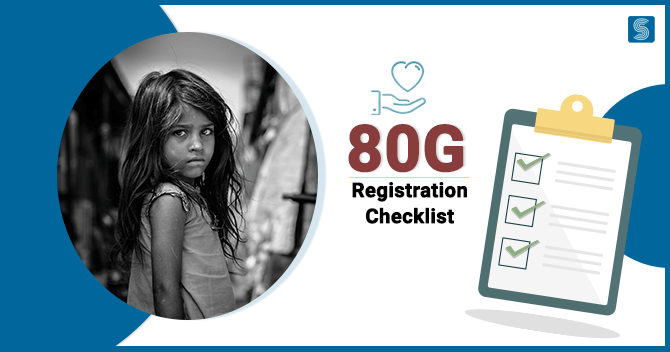Checklist and Requirements for 80G Registration

Dashmeet Kaur | Updated: Jan 14, 2020 | Category: NGO
The best way to find yourself is to lose yourself in the service of others.” A wise quote by the Father of the Nation, Mahatma Gandhi which emphasizes charity and donations. Considering the present day scenario where rage, violence, inhumanity drives our society, it is indispensable to spread the preaching of being generous. Lets understand the Requirements for 80G Registration.
Several Non-governmental organizations (NGOs) and non-profit organizations work rigorously to uplift the weaker sections of India. If you are also associated with any NGO, then you must perceive the 80G registration checklist and its benefits.
Table of Contents
What is the significance of 80G Registration?
What you give is what you get, likewise, if you donate to a charitable trust that has 80G certificate, then you will get tax exemptions either party or wholly. An NGO or Section 8 Company registered under Section 12A will enable the donor to avail tax exemption under Section 80G. It is utmost essential for all NGOs to apply for Section 12A and 80G registration.
NGOs with 12A registration have the authority to claim a complete exemption from the Income Tax Department. However, a charitable trust having 80G certificate leverage the advantage to attract more potential donors for donating substantial funds.
Fundamental Requirements for 80G Registration
Here is the list of requirements that every NGO needs to meet to acquire an 80G certificate:
- The foremost requirement for 80G registration is to get registered under the Section 8 and Societies Registration Act, 1860.
- One has to keep a record of all the transactions like receipt and expenditures of NGO in the book of accounts.
- The primary objective of the NGO must be to promote charitable purposes rather than to generate profits or any other personal goal.
- Also, the applicant NGO must utilize its assets and income exclusively for charitable purposes.
- The charitable institution should only be established in India.
- Lastly, the central income source of the NGOs should only be donations.
Eligibility Criteria to avail Tax Exemption
Let’s take a look at the candidates who can avail tax deduction benefits under 80G:
- An individual/entity that makes an eligible donation becomes entitled to tax exemption under Section 80G.
- As per Section 80G, all the donations given to the listed trust or organizations get qualified for a tax deduction.
- Further, if an NRI donates to the eligible trusts and institutions, then he also qualifies for tax exemption under section 80G.
- If an employee donates some money from his salary and if the donation receipt carries the employer’s name, thereon he can claim deduction under section 80G.
Donations that are not liable for any Tax Exemption/Deduction
- In case a donor donates to a foreign trust, then he cannot claim for any tax savings under section 80G.
- One cannot claim any deductions for the donations to the political parties, publishing or printing of flyers, pamphlets, and brochures.
What is the Percentage of Tax Deduction under Section 80G?
All the donors of charitable trusts must know about the percentage of deduction which they can access while donating in 80G certified NGOs:
- A donation to the Prime Minister’s National Relief Fund (PMNRF)[1] is eligible for 100% deduction under 80G without any limit.
- Any donations made to the Indian Olympic Association or sports institution is also eligible for 100 % deduction.
- When a company or individual donates to the trusts like “Indira Gandhi Memorial Trust,” thereby, it is eligible for about 50% deduction without any limit.
- An 80G registered institution which works on promoting family planning is eligible for 100% tax exemption.
- Any charitable trust that falls under the 80G list is eligible for a 50% deduction.
Documents Required for 80G Registration
These are the checklist of documents needed for 80G Registration:
- Certificate of Incorporate of the NGO;
- PAN card of the NGO;
- Form 10G;
- Memorandum of Association (MOA), in case the NGO got registered under Section 8 or Society;
- If the NGO is a Trust, provide Trust Deed;
- A copy of the utility bills such as electricity bills, House Tax Receipt, or water bills;
- If the NGO is situated on a rented property, then you must provide a NOC (No-Objection Certificate) from the landowner.
- A list of all the Board of Trustees along with the list of donors with their PAN card and complete address;
- A full list of the welfare activities.
Compliance Requirement under Section 80G
As per Section 80G, an applicant of the 80G registration must adhere with these prescribed requirements:
- Only a registered society, public charitable trust, and reputed educational institution can apply for the certificate of 80G. Moreover, if the Government has funded an institute, that can also enroll for 80G registration.
- The institution or trust which applies for the 80G certificate must be duly registered under Section 25 of the Companies Act, Societies Registration Act, 1860; or any other similar Acts.
- The applicant of NGO certificate should not belong to any religion or cast based and creeds based activity.
- The registered institution/trust must not hold any income which isn’t exempted.
- The respective institution or trust should only employ the donation funds for charitable purposes.
- In case the applicant indulges in other businesses, then he needs to maintain a separate account. Thus the received donations do not get merged with the savings of any other kind.
- The applicant should have kept an appropriate record of annual returns, bookkeeping, and accounting before he applies for the 80G certificate.
- Once the applicant procures the certificate, he will receive a receipt that must ensure timely renewal of the certificate. Thus, alerts the applicant to renew it for availing the available tax benefits.
A Complete Checklist for 80G Registration Procedure
To understand the Requirements for 80G Registration, follow these simple steps:
- Submit your application to the concerned Commissioner of Income Tax Department in the jurisdictional area of your organization.
- Now the Income Tax Department will closely inspect your application and documents.
- In case, the Commissioner isn’t satisfied with your provided information, he may ask for additional documents. Submit the documents within a speculated time frame.
- After completing the verification process, the Commissioner will issue the 80G certificate to your NGO.
The registration of an organization under Section 80G is valid for a period of one to three years. Hence, the Trust or NGOs must renew the certificate from time to time.
Conclusion
Also, Read: How to check Society Registration online?.














